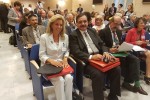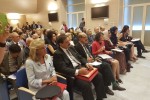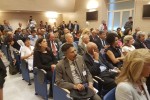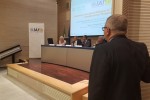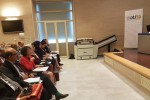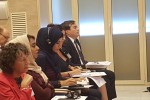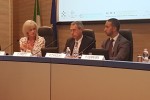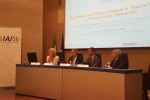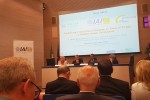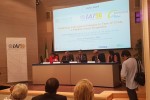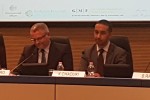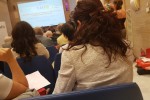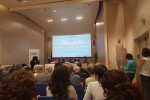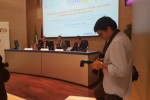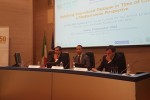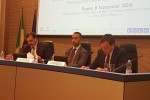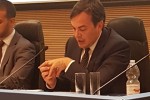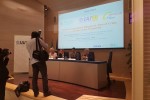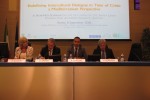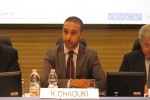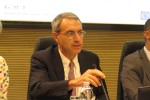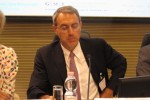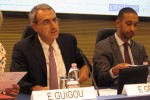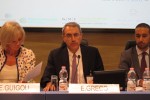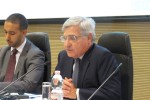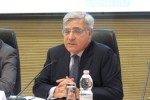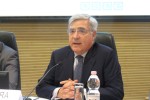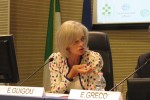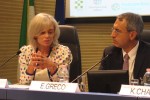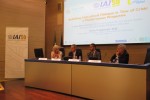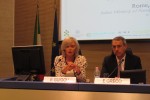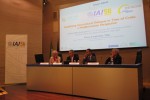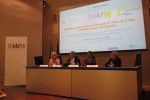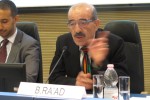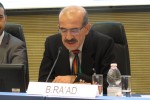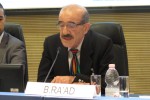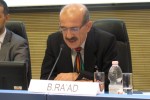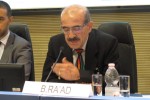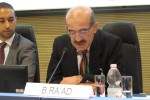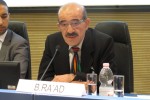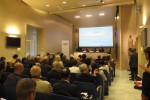2016 (EN)
08 September 2016
Tutte le Attività (EN) -
Anno 2016
 In order to emerge from the deep crisis in the Mediterranean, regional diplomacy must move quickly: we need a rethinking of intercultural and inter-religious dialogue in the region, new instruments and a new common identity. This, in summary, is the message launched during the seminar organised at the Farnesina by the Institute for International Affairs (IAI) in collaboration with the Italian Network for the Euro-Mediterranean Dialogue (RIDE), a reference point for the Anna Lindh Foundation network (ALF) in Italy. Redefining intercultural dialogue in the Mediterranean is the only way out of the situation in the region. We need to "build together a new common cultural identity", he said opening the works Pasquale Ferrara, ambassador of Italy designated in Algiers, reminding us how to do this we need to do it "involving all the actors of the region: civil society, non-governmental organizations, cultural operators of the southern shore", not only those of the northern shore. Therefore, not a Euro-centric vision but a Euro-Mediterranean vision. What must be clear "is that we are united by the same destiny and the challenges are the same for the whole Mediterranean: security, development, the fight against terrorism and extremist ideologies - not only Isis - mobility, young people,"said Anna Lindh Foundation President Elisabeth Guigou. To have a true intercultural dialogue we need to know each other and to do so,"it is necessary to use every means, every instrument", even technology. Extremism, Guigou recalled, flows along the net, "but the internet can be used to counteract the spread of this deviant ideology". "I hope - concluded the President of the Foreign Affairs Commission of the French National Assembly - that Europe will not only think about solving its problems, but that it will also look beyond its borders, that is to say the southern shore". The approach, the seminar's promoters repeat, must be multi-sectoral: economic, social and cultural, because the most affected by the crisis are young people, all too often driven by unemployment and social exclusion towards violence and extremism. And on the need to have a Mediterranean identity and a clear message, based on a cultural dialogue in order to be able to restart, insisted Enzo Amendola, undersecretary for Foreign Affairs, concluding the work. "Looking at past mistakes - he said - we must learn to find meeting points, but also to disagree. The mission, Amendola repeats, is that of "protecting our common cultural heritage", past and present, and defending it from that "totalitarian idea of wanting to erase it". Finally, we need "a positive planner for the Mediterranean, a partnership capable of defining a new geopolitical vision", in short,"a common future vision that focuses above all on young people in the area to solve the challenges facing the Mediterranean".
In order to emerge from the deep crisis in the Mediterranean, regional diplomacy must move quickly: we need a rethinking of intercultural and inter-religious dialogue in the region, new instruments and a new common identity. This, in summary, is the message launched during the seminar organised at the Farnesina by the Institute for International Affairs (IAI) in collaboration with the Italian Network for the Euro-Mediterranean Dialogue (RIDE), a reference point for the Anna Lindh Foundation network (ALF) in Italy. Redefining intercultural dialogue in the Mediterranean is the only way out of the situation in the region. We need to "build together a new common cultural identity", he said opening the works Pasquale Ferrara, ambassador of Italy designated in Algiers, reminding us how to do this we need to do it "involving all the actors of the region: civil society, non-governmental organizations, cultural operators of the southern shore", not only those of the northern shore. Therefore, not a Euro-centric vision but a Euro-Mediterranean vision. What must be clear "is that we are united by the same destiny and the challenges are the same for the whole Mediterranean: security, development, the fight against terrorism and extremist ideologies - not only Isis - mobility, young people,"said Anna Lindh Foundation President Elisabeth Guigou. To have a true intercultural dialogue we need to know each other and to do so,"it is necessary to use every means, every instrument", even technology. Extremism, Guigou recalled, flows along the net, "but the internet can be used to counteract the spread of this deviant ideology". "I hope - concluded the President of the Foreign Affairs Commission of the French National Assembly - that Europe will not only think about solving its problems, but that it will also look beyond its borders, that is to say the southern shore". The approach, the seminar's promoters repeat, must be multi-sectoral: economic, social and cultural, because the most affected by the crisis are young people, all too often driven by unemployment and social exclusion towards violence and extremism. And on the need to have a Mediterranean identity and a clear message, based on a cultural dialogue in order to be able to restart, insisted Enzo Amendola, undersecretary for Foreign Affairs, concluding the work. "Looking at past mistakes - he said - we must learn to find meeting points, but also to disagree. The mission, Amendola repeats, is that of "protecting our common cultural heritage", past and present, and defending it from that "totalitarian idea of wanting to erase it". Finally, we need "a positive planner for the Mediterranean, a partnership capable of defining a new geopolitical vision", in short,"a common future vision that focuses above all on young people in the area to solve the challenges facing the Mediterranean".






